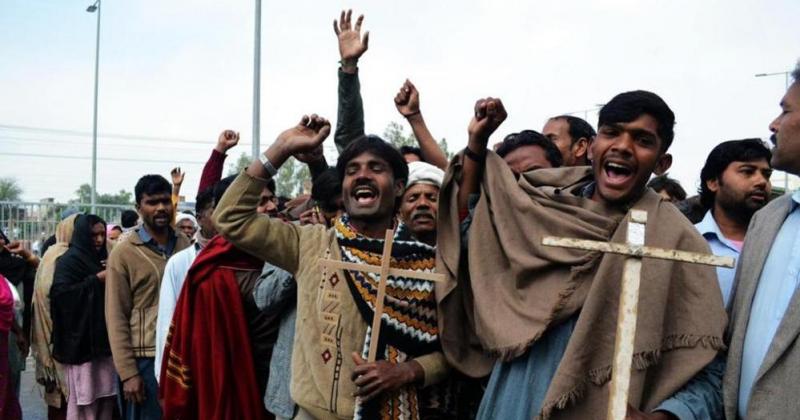Overlooking easy persecution campaigns, the pastor of Lahore tells the life of a Catholic community whose relationship with Muslims is growing wiser.
It is far too easy to look at the Catholic Church in Pakistan through a lens blurred by stereotypes. It is too easy to find members of the clergy or Pakistani laity (especially those who transferred to Europe) complaining of being victims of persecution. The infamous law of blasphemy, the story of Asia Bibi, existing discrimination, terrorist attacks with severe repercussion on Christian neighborhoods, all offer juicy material to paint the darkest pictures of annihilated faithful weeping and begging for compassion (and therefore for money) to the West. Not to mention how easy it is to exploit their moving stories of faith in well-orchestrated “Catholic marketing” campaigns, according to modern emotion-raising criteria, which have long since been used, as effective and profitable, even within Christian organizations.
The words of Sebastian Francis Shaw, archbishop of Lahore, a diocese in the heart of Pakistani Punjab, have the power to blow up the castle of stereotypes and prejudices on the Church’s life in Pakistan. The purely evangelical power of these words raise the temperature of faith and open hearts, with a breath of the Holy Spirit, of those who listen to them. From the Franciscan Order of the Friars Minor, Shaw was appointed auxiliary bishop in 2009 in the archdiocese of Lahore, the most important historic site of the country, the cultural, economic and political center of Pakistan. He soon managed to handle a delicate moment of transition and, as an apostolic administrator; he rolled his sleeves up until 2013 when Benedict XVI appointed him Archbishop.
Shaw is disarming when he speaks of the Church in Pakistan from a purely Christian perspective, which excludes whatever form of victimism, complaining, recrimination or protest, and follows the Beatitudes in full. An attitude towards life that ensures the closeness of Christ, and the always abundant gift of grace, to a community who knows it can’t count so much on its own strengths, as on the strength that comes from above. “God has blessed our Church with so many gifts that surprise us in our daily experience,” he tells Vatican Insider. “First of all, with the gift of vocations to the priesthood and consecrated life which opens our hearts to gratitude and the doors to the future” he continues, citing the many young people who every year enter the major Seminary of Lahore. These students become new priests: “We are preparing for seven new priestly ordination in 2017, while last year we celebrated the ordering of five Capuchin Franciscan priests and the first Salesian Pakistani. The growth of our community is symbolized by the need to set up three new parishes here in Lahore,” he says.
The bishop is far from hiding the problems that the Pakistani faithful live, but it is his perspective and the way he addresses them that is radically different, “I always think God’s grace is greater than difficulties and sufferings. The cross is a temporary passage that leads to resurrection. So is every Christian’s life, so is ours. Today we have a heart full of hope, we are certain that God does not abandon us”. Shaw likes to define Pakistani Catholics as “a people of Beatitudes,” because they live meekly, as the poor in spirit, as peace operators and sometimes as persecuted, “Today in our history – he reveals - there is God’s providential project: He wanted us here, He called us to be born in Pakistan at this time, to witness the Gospel in our hic et nunc. This is our mission, this means blessing our history and being open to grace of today, the Kairos that God has reserved for us”.
“Living by the Gospel,” without giving into persecutionary campaigns (which can be easily manipulated for business reason) is one of Shaw’s priorities, not to mention that Pakistani Christians, less than 2% of the population, are learning to live more serenely in a Muslim environment, freeing themselves from the “minority complex.”
Interreligious dialogue helps grow fertile relationships with non-Christians. As President of the Episcopal Commission for Ecumenical and Interreligious Dialogue, Shaw says, “Islamic-Christian dialogue in Pakistan widens and strengthens every day, involving as never before imam and Muslim leaders. We are objectively much closer than in the past, while common initiatives proceed on a regular base.”
The bishop then cites the recent spontaneous “Movement for Peace” which has seen, as a visible, significant and original move, the planting of several olive trees in front of churches, Catholic schools, seminars, mosques, madrassas, Islamic institutes, but also Hindu and Sikhs temples. The initiative involved him personally: “Participants and religious leaders of various faiths are convinced that God wants us to be instruments of peace and unity. We believe in the spirituality of dialogue and we share this approach that, starting with the relationship with God, empowers society with values of love, tolerance, peace, friendship, respect, and coexistence.”
“This spirit of collaboration gives us hope and brings forth fruits of peace. I am very optimistic,” he remarks. Shaw’s optimism is rooted in an evangelical look on Catholic stories in Pakistan. With this perspective, “the people of God, even when struggling, continue to crowd the churches and to show great faith,” he concludes. He is optimism based on the “certain hope,” as Francis of Assisi says, of “God-with-us”.
